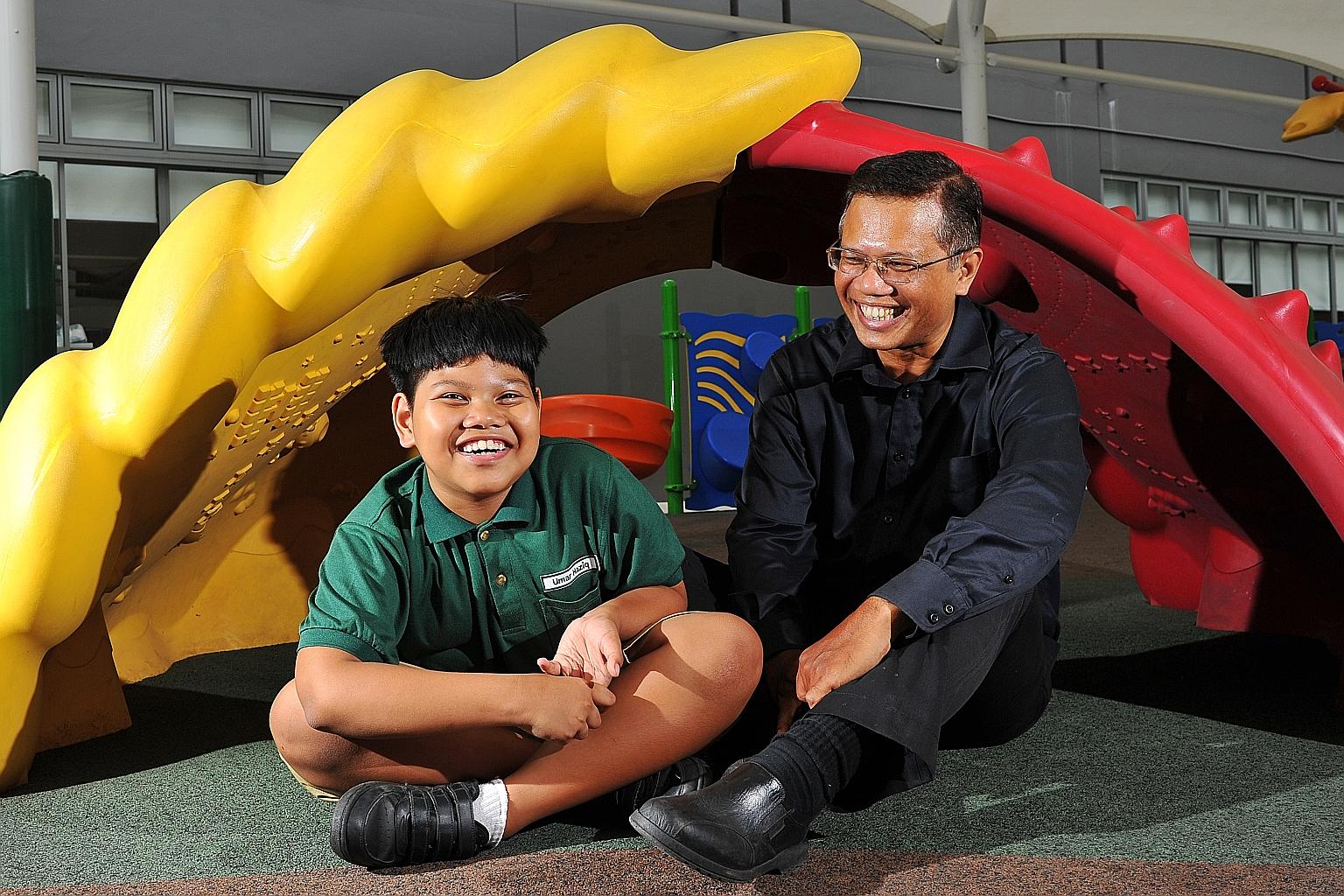LIVING WITH INVISIBLE DISABILITIES
Boy with autism has few playmates
Sign up now: Get ST's newsletters delivered to your inbox

Umar with his father at Fun Square, Sensory Park, in Eden School. Because of autism, Umar's learning development is slower and he has difficulty interacting with other people.
ST PHOTO: LIM YAOHUI
Nine-year-old Umar Haziq loves going to the playground and interacting with other children. But he finds it hard to understand play rules and unwittingly alienates himself from the rest.
What the children do not understand is that Umar has autism. It affects his learning development and impairs his social interaction and communication skills.
His father, Mr Mohamed Jusri Bangi, 48, says: "When he's not following rules, they run away from him. As a parent, when you see children running away from your child, it's quite disheartening."
Once, Umar - who was diagnosed when he was four - hit a girl, and her grandparents scolded him. They did not understand Mr Jusri's explanation about autism spectrum disorder, and he received an earful for not controlling his child.
Autism affects one in 68 children and one in 42 boys, but public awareness is low.
-
Autism
NUMBER AFFECTED
About one in 68 children. It is more common in boys, with a rate of one in 42.
NATURE OF DISABILITY
Autism affects a person's ability to make sense of the world and relate with others. It is known as a spectrum disorder as no two persons with autism are the same. People with autism differ in the severity of the disorder and intellectual abilities.
Children with autism do not outgrow it, but symptoms may lessen with intervention. Structured intervention and training will help individuals acquire living skills, like how to prepare food and to shower, but will not cure the condition.
TREATMENT/SUPPORT
The Early Intervention Programme for Infants & Children provides therapy and educational support services for infants and young children with special needs. Some voluntary organisations provide therapy for youngsters, teaching skills in mobility, play and socialising and helping them better adapt to the environment.
RESOURCES
"He still cannot mingle with the normal kids," says Mr Jusri. So Umar spends most of his playtime with his cousins, especially the younger ones whose play rules are easier for the boy to follow.
Taking him on outings can be difficult. Children with autism can find noises, crowds and experiences outside their routines overwhelming, and can have meltdowns.
"You get stares, rude comments. Because they think that you're not a good parent. Sometimes, it is difficult to control them so they run around," says Mr Jusri. He takes his son to less crowded places, and to movies where there are other children so he is not the only noisy one.
But Mr Jusri says public understanding has improved, and sometimes kind strangers come up to talk to Umar instead of shunning him.
During the hour-long interview and photo session at Eden School, which he started attending last year, Umar was well-behaved, although restless. The school specialises in helping children with autism.
He communicated well, telling his father he wanted to play outside, and answering questions about his favourite cartoon SpongeBob SquarePants, and was cooperative during the photo shoot.
Mr Jusri credits Eden School with giving him tips on how to keep Umar calm and cooperative. For example, showing Umar a schedule so that he knows what happens next removes his anxiety. Umar has learnt how to ask for help, so he no longer throws tantrums when he feels helpless and frustrated.
Learning to manage Umar better has given the single father a measure of relief, he says. Mr Jusri divorced his wife last year and singlehandedly juggles managing Umar and two older children, and his job at the Land Transport Authority, with household chores and finances. Every morning, he takes Umar to Eden School in Bukit Batok from their Woodlands home. Then he travels to work in Sin Ming Drive, and goes back to Eden at lunchtime to pick up Umar and drop him off at a private daycare centre for children with special needs. After work, he takes Umar home and prepares dinner. Sometimes he leaves Umar in the care of a family member, to have time for himself.
He advises parents of children with autism: "You need to take care of yourself. If not, you'll go crazy."
His greatest worry is Umar's future. "I don't know if his sisters will want to take care of him or not. I don't know if my ex-wife will take him or not."
Kok Xing Hui


